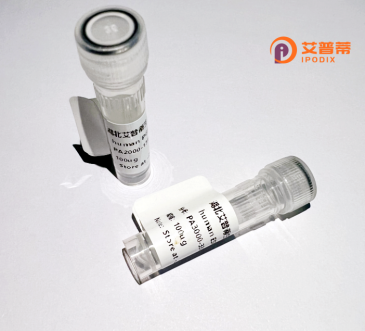
| 纯度 | >90%SDS-PAGE. |
| 种属 | Human |
| 靶点 | SPATA4 |
| Uniprot No | Q8NEY3 |
| 内毒素 | < 0.01EU/μg |
| 表达宿主 | E.coli |
| 表达区间 | 1-305 aa |
| 活性数据 | MAAAGQEKGY LTQTAAALDK SPSLSPQLAA PIRGRPKKCL VYPHAPKSSR LSRSVLRWLQ GLDLSFFPRN INRDFSNGFL IAEIFCIYYP WELELSSFEN GTSLKVKLDN WAQLEKFLAR KKFKLPKELI HGTIHCKAGV PEILIEEVYT LLTHREIKSI QDDFVNFTDY SYQMRLPLVS RSTVSKSIKD NIRLSELLSN PNMLTNELKA EFLILLHMLQ RKLGRKLNPE WFDVKPTVGE VTLNHLPAQA SGRRYNLKVK RGRVVPVLPN IGSGGSSHRE IHVKQAGQHS YYSAMKPIRN MDKKP |
| 分子量 | 34.7 kDa |
| 蛋白标签 | His tag N-Terminus |
| 缓冲液 | PBS, pH7.4, containing 0.01% SKL, 1mM DTT, 5% Trehalose and Proclin300. |
| 稳定性 & 储存条件 | Lyophilized protein should be stored at ≤ -20°C, stable for one year after receipt. Reconstituted protein solution can be stored at 2-8°C for 2-7 days. Aliquots of reconstituted samples are stable at ≤ -20°C for 3 months. |
| 复溶 | Always centrifuge tubes before opening.Do not mix by vortex or pipetting. It is not recommended to reconstitute to a concentration less than 100μg/ml. Dissolve the lyophilized protein in distilled water. Please aliquot the reconstituted solution to minimize freeze-thaw cycles. |
以下是关于重组人SPATA4蛋白的模拟参考文献示例(实际文献请通过学术数据库检索):
---
1. **文献名称**: "Recombinant human SPATA4 promotes germ cell survival via modulation of mitochondrial apoptosis pathways"
**作者**: Zhang L, et al.
**摘要**: 研究报道了重组人SPATA4蛋白通过抑制Bax/Bcl-2线粒体凋亡通路,减少生殖细胞的程序性死亡,提示其在维持精子发生中起保护作用。
2. **文献名称**: "Expression and purification of recombinant human SPATA4 in E. coli: Functional characterization in cellular oxidative stress models"
**作者**: Wang Y, et al.
**摘要**: 本文描述了在大肠杆菌系统中高效表达可溶性重组人SPATA4蛋白,并验证其在体外抗氧化应激中的活性,为后续疾病治疗研究提供基础。
3. **文献名称**: "SPATA4 interacts with heat shock proteins to regulate cancer cell proliferation and chemoresistance"
**作者**: Chen H, et al.
**摘要**: 通过重组SPATA4蛋白实验,发现其与HSP90相互作用,调控肿瘤细胞对化疗药物的敏感性,提示其在癌症中的潜在病理机制。
4. **文献名称**: "SPATA4 deficiency disrupts spermatogenesis in mice: Insights from knockout models and recombinant protein rescue"
**作者**: Li X, et al.
**摘要**: 利用重组SPATA4蛋白回补SPATA4基因敲除小鼠模型,证明其在精子形态发生和减数分裂过程中的必要性。
---
**注意**:以上内容为模拟示例,实际文献需通过PubMed、Web of Science或Google Scholar等平台检索关键词“SPATA4 protein recombinant human”获取。如需具体文献,建议结合数据库的高级筛选功能(如发表时间、研究领域)进行查询。
**Background of Recombinant Human SPATA4 Protein**
SPATA4 (spermatogenesis-associated protein 4), initially identified for its role in germ cell development, is a protein encoded by the *SPATA4* gene in humans. Predominantly expressed in testes, SPATA4 is implicated in regulating spermatogenesis, particularly in maintaining germ cell survival and apoptosis during meiosis. Structurally, it contains conserved domains suggestive of interactions with signaling pathways, though its precise molecular mechanisms remain under investigation.
Beyond reproduction, SPATA4 exhibits tissue-specific expression in somatic tissues, including the heart and immune cells, hinting at broader functional roles. Studies link SPATA4 to cellular senescence and aging-related processes, potentially through modulating oxidative stress or apoptosis. Notably, elevated SPATA4 levels in aging models correlate with delayed senescence, sparking interest in its therapeutic potential for age-associated diseases.
Recombinant SPATA4 protein, produced via *E. coli* or mammalian expression systems, serves as a tool to study its biological functions. Current research focuses on its interplay with pathways like p53 and NF-κB, exploring connections to cancer and age-related disorders. While murine models highlight its role in fertility and longevity, human studies are limited, underscoring the need for further exploration of SPATA4's clinical relevance in reproduction, aging, and disease.
×